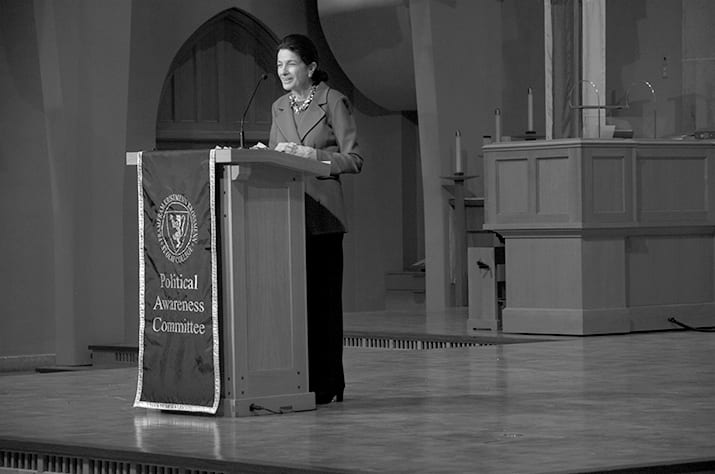
On Wednesday, April 29 the Political Awareness Committee invited former Republican senator Olympia Snowe to speak to the St. Olaf community. She served as one of Maine’s senators from 1995 to 2013. Snowe made history as the fourth woman in American politics to be elected to both houses of Congress and the first to serve in both houses of a state legislature. Snowe is known for her criticism of the extreme partisanship in Congress, as outlined in her 2013 book,Fighting for Common Ground: How We Can Fix the Stalemate in Congress. Her speech, entitled “What’s Gone Wrong in Washington and Why it Doesn’t Have to Be This Way,”addressed these problems and challenged students to rethink the paralyzing divide of modern-day Congress.
Snowe started her speech with a summary of her personal background. Both of her Greek immigrant parents died before she was nine. After this tragedy, she moved in with her aunt and uncle but continued to commute over an hour to school every day, occasionally getting stranded in Grand Central Station overnight and sleeping on benches. She has always considered herself “a minority of a minority of a minority,” as a female Greek-American from New York who moved to Maine.
On Snowe’s first day as a senator of Maine, Senate Majority Leader Robert Dole caught her looking around the chambers in awe. He said to her, “You are looking around wondering how you got here, but in six months you will be looking around wondering how everyone else got here.” She found out he was right.
“There are smart people in Congress, but there are fewer and fewer who are willing to reach across the aisle and act bipartisan,” Snowe said. She discovered that for many Congressmen, the first priority was working towards re-election instead of focusing on making productive changes during their current term. She expressed frustration that many politicians only care about the potential gain of political capital from each bill rather than the content of the bill itself and therefore sacrifice bipartisanship to please donors and constituencies.”
The 2013 and 2014 Congressional sessions were the least productive in modern history. The last time Congress was this ineffective was in 1805, when the government ran out of money after the Louisiana Purchase. This extreme gridlock is unacceptable to Snowe.
She maintained that when Congress fails to accomplish anything, the American citizens feel the lack of productivity and lose trust in the government. She cited that the recent presidential election had the lowest turnout of voters – 36 percent – since 1942 when America was at war.
“Americans feel powerless to affect the process,” Snowe said. “They don’t receive any benefit from participating in their democracy.”
In 2014, over half of the American public supported compromise across party lines. Snowe believes that now is the time to enact change.
She went on to detail many of her accomplishments during her years in Congress and how she personally tried to end partisanship and encourage compromise. Because of her work, she was named the 54th most powerful woman in the world by Forbes magazine in 2005 and one of the top 10 U.S. Senators by Time magazine in 2006.
In 2012, Snowe chose not to seek re-election to the Senate, but she has stayed committed to encouraging bipartisanship in Congress.
“I did not leave the United States Senate because I no longer believed in its potential, but precisely because I do. I wanted to give voice to the millions of Americans who believe as I do that the Congress has gone awry,” Snowe said.
“After having two hyper-polarizing political leaders from either side of the aisle, Newt Gingrich last spring, and Rev. Al Sharpton in the fall, it was great for PAC to have someone that stresses bipartisanship,” said Grace Kane ’15, a previous College Republicans representative on PAC.
Snowe urged the audience to speak up about the importance of bipartisanship, saying that “silence is not golden. We have to demand cooperation, and the voices that demand cooperation have to be louder than the voices that demand polarization.”
dipietro@stolaf.edu
Photo Credit: KATELYN REGENSCHEID/MANITOU MESSENGER

